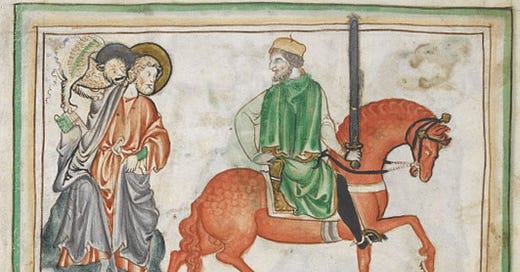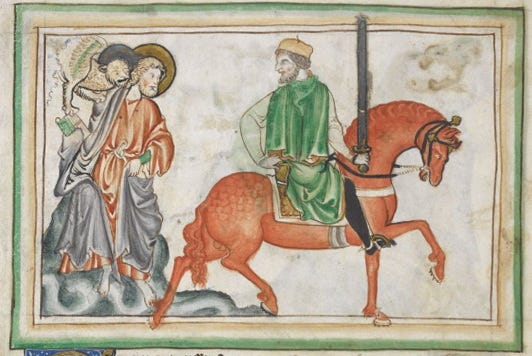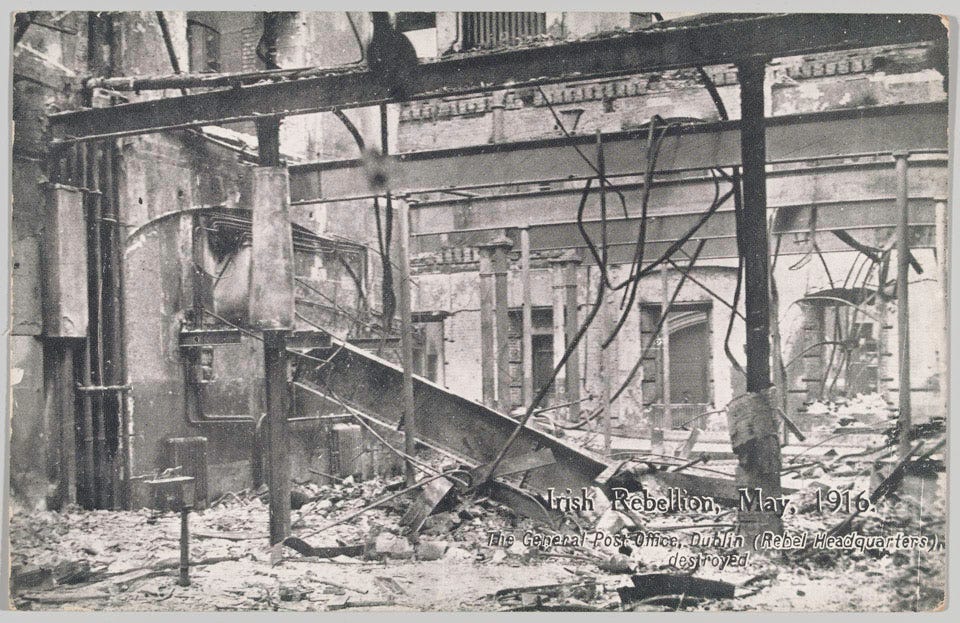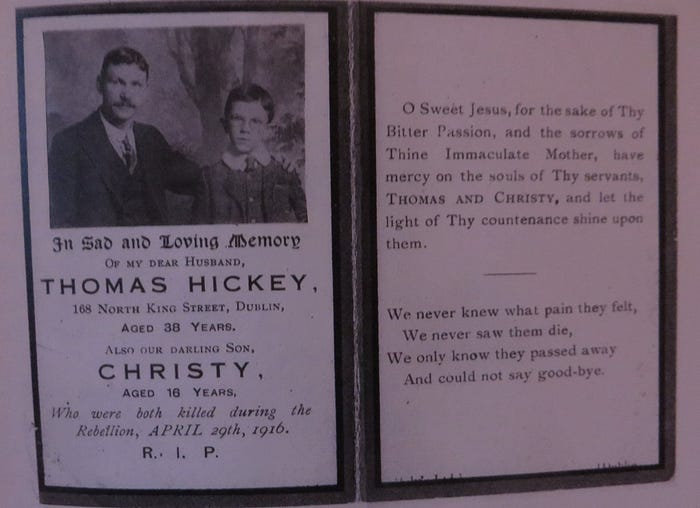When He broke the second seal, I heard the second living creature saying, "Come." And another, a red horse, went out; and to him who sat on it, it was granted to take peace from Earth, and that men would slay one another; and a great sword was given to him.
- Revelation 6:3–4
It is November 11 2023, and it appears to be safe to say that the worst of the Apocalyptic Four Horsemen—war—has returned to his traditional prominent position on the world stage.
Now, here’s a fun fact: I am probably the direct descendent of a 20th century terrorist. Once, after a few too many rum and cokes, my grandfather confided in me that his Northern Irish dad had fled to Canada because he was identified by the IRA as someone who’d been hiding out in bushes along the North/South border and shooting Catholics dead. And that’s why he met my Calgarian grandmother and why I exist. Grampa might have been telling tall tales. But I have to say, he sounded deadly serious.
Now, here’s a comment that just showed up on our band’s public facebook page:
Obviously I’m just going to reply with my usual “punk is supposed to be aggravating”.
But the comment actually comes at the perfect time, because it is mandatory, on November 11, to reflect on what war means for all of us. To take this guy’s advice and to “wise up”… and to think about he might take his own advice.
So let’s review. The Foggy Dew. What is that song about? What is its message?
As most people know, large parts of what is now the Republic of Ireland were subject to fairly awful colonial rule for hundreds of years. Due to horrific mismanagement, Ireland lost half of its population in the 19th century while over a million starved to death, mirroring the fate of other colonized subjects in, for example, India.
In this context, The Foggy Dew is about the Easter Rising of 1916, where Patrick Pearse read out the Proclamation of the Irish Republic from a barricaded position at the Dublin General Post Office. The rising provoked a British response, and the song speaks of “Britannia’s Huns with their long-range guns”, who shelled both the post office and the surrounding area in a (successful) attempt to suppress the rising. This is what the post office looked like when they were done:
By some estimates 310 civilians and 117 military personnel were killed in the fighting, and while some of the responsibility for civilian deaths is disputed to this day, most civilians probably died as a result of British artillery and machine gun fire. They adopted a “those guys might be rebels” approach to attacking the city, even resorting to massacres of civilians who were easily identifiable as noncombatants. And as Hannah Smyth notes in her excellent recounting, a few of those civilians really were shot by the rebels, maybe accidentally, maybe on purpose. It happened.
If some of these complex themes aren’t ringing any bells for you in late 2023, by the way, they really should be.
After the rising, most of its leaders were summarily executed by firing squad, including Pearse. I’ve been to Kilmainham Jail in Dublin and I’ve seen the bullet holes in the wall; it is a somber and difficult visit. Those executions turned the tide of public opinion and the resulting anti-colonial sentiment lead directly to the Irish war of Independence, 1920-21. The lyrics to The Foggy Dew were written in 1919, however, and so it cannot be about anything that happened in this latter period: the formation of the IRA, the increasing escalation of violence that would last for decades, and the truly awful atrocities committed by both sides.
Rather, The Foggy Dew commemorates the martyred leaders of the Rising, in no way celebrating the deaths of civilians or innocents or indeed of anyone, and laments that so many Irish men were off fighting and pointlessly dying in WWI for Britain when they could have been at home fighting for independence. That one major section of the song—three out of eight verses—is particularly haunting and meaningful for a band that has a whole album about WWI:
Right proudly high in Dublin town
Hung they out a flag of war
'Twas better to die 'neath that Irish sky
Than at Sulva or Sud-El-Bar…
‘Twas Britannia bade our Wild Geese go
that small nations might be free
But their lonely graves are by Suvla’s waves
or the shore of the Great North Sea
But had they died by Pearse’s side
or fought with Cathal Brugha
Their names we would keep where the Fenians sleep
‘neath the shroud of the foggy dew
Now, of course, a hard-nosed Protestant Orangeman living in Northern Ireland isn’t going to like hearing The Foggy Dew, it’s a rebel song that is played by people on the other side of that still-raw conflict. And make no mistake, the IRA did end up in a very dark place, descending into a kind of pointless retributive madness and murdering civilians with car bombs in a way that had no real connection to Irish liberation. The kind of madness, remember, that my own great-grandfather man have succumbed to. The kind of madness that representatives of England famously embraced on Bloody Sunday (1972). It all turned into a blood-lust revenge-fuelled fucking nightmare.
(*ring*….*ring*… bells, anyone?)
But The Foggy Dew is about none of that. It is about living under colonial rule, gathering a small volunteer army where you live, holing yourself up in a Post Office, running up a new flag and then trying to fight back as you’re mercilessly shelled from long range. That’s sort of…. different, hey?
So while there are interesting issues surrounding the singing of rebel songs, just imagine thinking that the message of The Foggy Dew is actually analogous to that of a song that portrays the rescuing firefighters of September 11, 2001 as the terrorists. It would be hard to imagine someone more in need of “wising up” than a person who thinks this. The two situations are vastly different.
I marched in a couple of anti-war protests in 2002-2004, but even we opponents of American imperialism understood that 9/11 was just unjustified mass murder carried out by people who could not have really believed that it would undermine imperialism in any way. We of course had to acknowledge that the first responders were heroic, and that 9/11 was nothing but murder for murder’s sake.
Notice that Pearse and Connolly and the other members of the Irish Rising did not march into London and execute 3,000 British civilians, nor did they just cynically murder innocents for the sake of it. They stood on their own land, made their own declaration, and endured what came as a result, hoping to inspire revolutionary spirit. And while it pains me to even have to type this out, the British soldiers who destroyed whole sections of Dublin using long range artillery were not analogous to the 9/11 first responders.
And now, here we are, on Rememberance/Veteran’s Day, November 11, 2023, with (at least) four major civil and international wars raging across the world, each threatening to explode into something bigger and more horrific. I hope we can all agree that the killing of innocents is a moral catastrophe. But what makes this all very complicated is that sometimes people legitimately do have reasons to take up arms in a way that can endanger innocents, and that’s what The Foggy Dew shows us. Real life isn’t Star Wars, where the rebels somehow manage to liberate themselves from the Empire while only putting faceless stormtroopers in danger. In 1789 (France) and 1791-1804 (Haiti) and 1857 (India) and 1905 (Russia) there were serious, powerful complaints that justified dangerous and lethal armed rebellion. Taking up arms is not always pointless, terroristic mass murder, and to publicly compare the leaders of the Easter Rising to the 9/11 attackers is to show us all that you would rather live in a simple little fantasy world where everything is… black and white.
So all I can say to you, today, on November 11 2023, is this: beware anyone who thinks that war is simple, that some gut reaction of theirs is all they need to justify some sloganized “take” on mass human conflict. Beware the platforms and sources which encourage and reward those sloganized takes. War is almost never simple. I have my thoughts about what is going on right now, and so, likely, do you. I respect you wherever you are, so long as you are reading and thinking. But in addition I hope that the conviction of your ideals never lulls you into the lethargic, slack-jawed moral slumber of the black and white, where death is always on the prowl, and where that horseman’s gleaming sword is suspended, delicately, over all of us.








Studied international conflict resolution for a bit. It's always more nuanced and more complex than you can catch in a bumper sticker. I toured Belfast with a retired Black Taxi driver and spent some inadequate time studying at Queen's University. Details get hazy and people forget that the 1916 rebels were Catholic, Protestant, and atheist. Foggy Dew is a product of that intense bonfire building between 1916 and 1920. The IRA reached back to it. They used it. They still try and paint themselves as the torch-bearers of Irish rebellion but there are sizable gaps in that narrative. Your post is from someone who prefers junk history.
A facebook memory came up today - "It's remembrance day, my father's generation knew the axe would fall like his fathers before - I'm glad my sons will never have to experience war"
Quite a difference five years makes. I'm not so sure anymore.
"And if at times I curse bit,
you need not read that part of it.
For all through like horror runs,
the red resentment of the guns.
And you yourself would mutter when,
they took the things that once were men,
and sped them through that zone of hate,
to where the dripping surgeons wait.
And wonder too., if in God's sight.
War ever, ever can be right"
-Robert Service